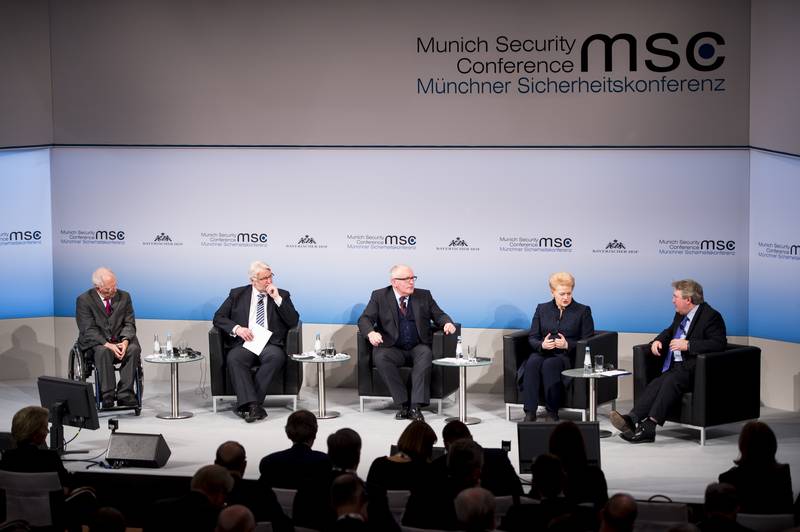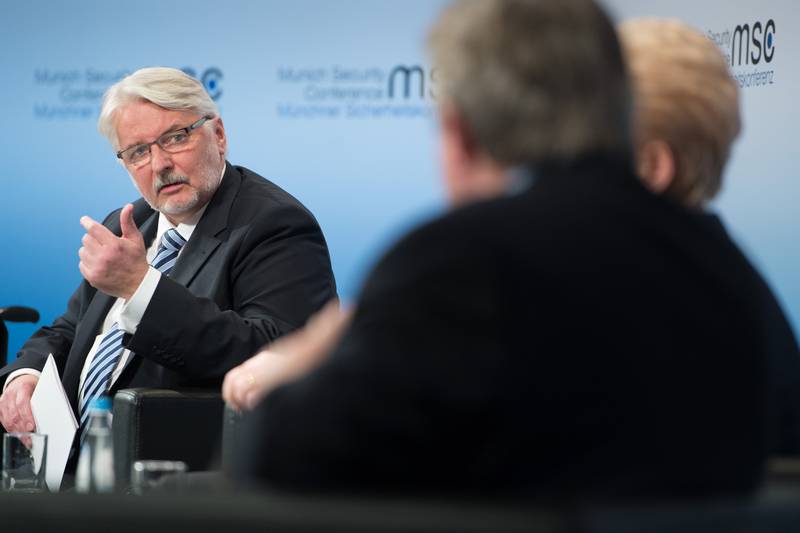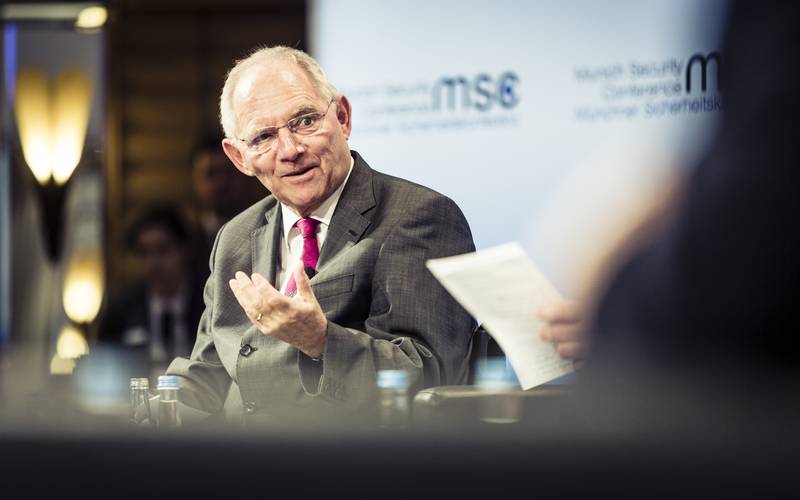The Debate on the EU - Informed vs. Uninformed, or Intentionally Misleading
Adelina Marini, February 22, 2017
 I have began to avoid debates on the future of Europe, for in the last few years they have turned into a boring and pointless exercise, during which moderators ask some too general questions, which have already been asked a thousand times and the invited participants reply in an even more general manner, for they need to take care of their electoral image at home, while at the same time preserving their international image as well. This was exactly the way that last Friday’s debate began as part of the Munich Security Conference, entitled "The Future of the European Union: United or Divided?". The participants in the panel discussion were the President of Lithuania Dalia Grybauskaitė (a text on her participation can be read here), European Commission First Vice-President of the Frans Timmermans (The Netherlands, Socialists and Democrats), Polish Foreign Minister Witold Waszczykowski, and the Finance Minister of Germany Wolfgang Schäuble. The panel was moderated by The Financial Times journalist Philip Stephens, who, being British, was sure to point the conversation entirely into a Brexit direction.
I have began to avoid debates on the future of Europe, for in the last few years they have turned into a boring and pointless exercise, during which moderators ask some too general questions, which have already been asked a thousand times and the invited participants reply in an even more general manner, for they need to take care of their electoral image at home, while at the same time preserving their international image as well. This was exactly the way that last Friday’s debate began as part of the Munich Security Conference, entitled "The Future of the European Union: United or Divided?". The participants in the panel discussion were the President of Lithuania Dalia Grybauskaitė (a text on her participation can be read here), European Commission First Vice-President of the Frans Timmermans (The Netherlands, Socialists and Democrats), Polish Foreign Minister Witold Waszczykowski, and the Finance Minister of Germany Wolfgang Schäuble. The panel was moderated by The Financial Times journalist Philip Stephens, who, being British, was sure to point the conversation entirely into a Brexit direction.
The rule of law, stupid!
Despite a sluggish and boring start, the debate suddenly turned into a fundamental and essential discussion about the EU. This happened when Mr Stephens asked the question whether in fact the problem of the EU was values-based, a subject euinside too analysed recently. The question was asked following the speech of the Polish foreign minister, in which Orbán’s euroscepticism was evident and in which he accused Frans Timmermans of presenting a rosy picture of the state of the EU. The former Dutch foreign minister and currently right-hand-man to European Commission boss Jean-Claude Juncker (Luxembourg, EPP) literally exploded. With plenty of passion and emotion he adamantly discarded the notion that the EU is divided in values. “If you look what happened last week [week before last] in Romania when people had the impression that their governments no longer fight corruption, they went into the streets immediately". These words were followed by thunderous applause from the Munich hall, overflowing with heads of state, analysts, academics, national and European politicians.
Frans Timmermans was unstoppable: “These values are shared everywhere in the EU. When women in Poland had the impression that their rights were going to be curtailed by the government or parliament they went into the streets immediately because they share the same values”. Which was followed by more loud applause, pouring fresh fuel into the first vice president. He decided that this is the time to show Poland’s ultra-conservative government that although the rule of law mechanism of the EU is toothless, the Commission’s diligence isn’t. “And let me say something about the nature of this EU. The nature of this EU is based on law, on treaties we signed and everybody is equal before the law. Yes, you can have different speeds; yes, we can head all in the same direction not in the same speed, fine. I'm fine with that. But everybody is equal in front of the law. And this law is decided at European level and should be applied in member states. And this law, the rule of law, dictates that governments do not interfere with the judiciary, do not curtail judges when they rule”, continued Mr Timmermans with even greater passion and emotion, earning further applause.
His straight-forward attacks on Poland come at a time when the EC is depleting its inherently weak set of instruments for exerting pressure and the chances of Warsaw ever being punished are miniscule, for such action requires unanimity in the Council and Hungary has already announced it is backing the Poles.
And so began the probably strongest and most meaningful debate about Europe in a long, long time, placing focus on the fundamentals. This had to happen a long time ago, after in 2013 the EC sharply changed the process of reporting on the progress of EU candidate countries. Back then, the Commission entitled its enlargement strategy “Fundamentals first”, among which the rule of law was underlined as a main priority. Four years later, the EC, represented by Frans Timmermans, reminded member states that the rule of law is what the Union was built upon in the first place. This became necessary after the Polish foreign minister went into an uneven battle with the vice president. “When will a constitutional tribunal be created in the Netherlands, according to the European standards? It's a rhetoric question, you don't have to answer!”, said Witold Waszczykowski triumphantly among a hushed audience.
"No, I gladly want to answer", replied heatedly Frans Timmermans. "The day in the Netherlands the government would interfere in violation of the Constitution with the judiciary I would also go into the street. There is no provision anywhere in law that requires a country to have a constitutional tribunal, but if you have a constitutional tribunal in line with your constitution, then please do respect the rules of your Constitution!", added the Vice-President once again followed by thunderous applause. The argument was interrupted by other members joining the discussion, but continued a bit later, uncovering one of the major shortcomings of euroscepticism – it is often based on lack of knowledge, incompetence, or conscious manipulation. In the case of the Polish foreign minister it was surprising ignorance of European legislation.
He tried to explain that Poland joined the EU just because of the four freedoms and nothing else. Then he protested that there were no straight-forward criteria for the election of institutions’ bosses, which is clearly written out in the EU treaties or in commonly agreed on rules between member states. This forced Frans Timmermans into reading out loud the contents of Article 2 of the Treaty for the EU. “But the Union is so much more than the 4 freedoms’, that’s why ,I think, at this stage, I would like to read out Article 2 of that treaty which says: 'The union is founded on the values of respect for human dignity, freedom, democracy, equality, the rule of law and respect for human rights, including the rights of persons belonging to minorities. These values are common to the member states in a society in which pluralism, non-discrimination, tolerance, justice, solidarity and equality between women and men prevail'”, said Mr Timmermans.
Trust, Sancho!

The conversation of Timmermans and Waszczykowski revealed one of the EU problems – competence. In this sense we are not talking about some serious ideological clash between eurosceptics and pro-Europeans, but between informed, responsible leaders and incompetent or often deliberately manipulative leaders. Frans Timmermans, however, disagrees. At the World Economic Forum in Davos, three weeks prior to the Munich conference, he participated in another panel on the future of Europe in the company of people, whom we can safely name informed and competent. He was joined by Dutch PM Mark Rutte, Martin Schulz – who back then still was the boss of the European Parliament, but is now already in the lead in German polls, ahead of Chancellor Angela Merkel – and Ana Botín, the executive chairwoman of the Banco Santander group. Moderating the panel, entitled “What Europe, now?” was Maurice Lévy (chairman of Publicis), whose questions managed to inspire panel participants and fuel passions.
It was during this panel that Frans Timmermans stated that, currently, there is a heavy ideological battle going on in all societies between people, who wish for protection through the closing off of societies, which would inevitably lead to restriction of freedoms, and of people, who believe in an open society and in diversity as an answer to all challenges of the future. A sharp argument started in the midst of this panel as well, the quality of which, however, was at an entirely different level. The panel was dominated by the gentlemanly argument between Mark Rutte and Martin Schulz. Rutte, whose party is constantly into a race in the polls before the parliamentary elections in Holland in March against the party of eurosceptic nationalist Geert Wilders, stated that the problem within the EU is that too many states fail in their commitments to implement reforms.
"Too many countries, particularly in the south of Europe are not doing that and that is creating a fundamental distrust within Europe and particularly between the north and the south", said Rutte, causing the outrage of the candidate of German Social Democrats to the post of German chancellor Martin Schulz. “I want you to consider to be very prudent with this request to some of the member states that they have to endorse reforms, which are defined by whom?”, he asked. “The Stability and Growth Pact”, was Mark Rutte’s short answer. The two of them started to hit each other with data and positions. At moments they agreed with each other and sometimes they drifted even further. According to the Dutch PM, the idea of “an ever closer union” is already dead. "What we now have is a Europe, which has to be relevant and not a sort of a project, which has sort of momentum of its own", he added.
"That's wrong!", cut in Martin Schulz. “More than ever we need in the 21st century an ever closer union of citizens in the EU“, he added heatedly. “I'm convinced it is the fasted way to dismantle the EU. You have a very romantic judgement of history and I like that. You speak about it passionately, but the EU of Helmut Kohl and Francois Mitterrand is not a model to build a EU of the future. It has to be a very pragmatic relationship. But if we continue talking that we are step by step moving towards some sort of a European super state, that is the fastest way, Martin, to dismantling the EU”, replied Mark Rutte in a composed tone of voice.
"This is not romanticism. Looking at what is happening in Europe today - this is very actual! The enlargement of the EU to the Eastern countries - could we imagine today Poland, the Baltic countries not being a part of the EU, taking into account what happens in Ukraine, about what we can speak today in Europe? ", asked Martin Schulz and was awarded with thunderous applause from the hall. “This is not romanticism for an ever closer union on countries. With pragmatic solutions, you are right, I agree”, he added. Further into the discussion Martin Schulz continued: “The competition to Europe is not a fair one. Other parts of the world are more competitive than we are, but why? Because they are not respecting our standards. They have not a minimum salary, they have no trade unions, there’s no right of strike, there are governments who close the internet when the opinion of the internet is not confirming with the line of the government, etc, etc. They don’t care about environmental standards or minimum social standards”, he said further.
Reform of the EU with no Treaty change and on several speeds
Beyond ideological battles and the fight with alternative factology the European Parliament pulled out last week once more to the negotiating table the proposals for deepening of European integration, but without touching the Treaties. In a resolution, voted in on February 14 with 329 votes “for”, 223 “against”, and 83 “abstained”, the European Parliament points out the articles in the founding treaties, which allow further integration. The main focus of the resolution was on the need to use more often the possibility of a qualified majority vote, rather than unanimous one, as is common practise now. Several new ideas are proposed, like merging the positions of EC President and President of the European Council, although it is being pointed out that this will not be in the EP’s best interest.
It is also suggested that the Council becomes a true legislative chamber by lowering the number of configurations (Economic and Financial Affairs Council configuration, Justice and Home Affairs Council configuration etc.) and some criticism is directed towards ministers for often washing their hands off and transferring a heavy legislative burden to the European Council (leaders). The surprising bit in the resolution, whose authors are Mercedes Bresso (Socialists and Democrats, Italy) and Elmar Brok (EPP, Germany), is that a multi-speed Europe is being favoured and this is done through the enhanced cooperation instrument, under which several member states have currently agreed to implement a tax on financial transactions and under which the future European Prosecution for fighting financial fraud is going to be built. The resolution proposes a widening of the scope of the European Prosecution, so that it includes the battle against organised crime, fraud, and corruption, and also to wipe off the fragmentation in implementing European law.
It is proposed that member states come up with three instead of one candidate for Commissioner and from both genders too. Once more the issue is raised about lowering the EU budgetary term from seven years down to five, so that it will coincide with the term of the EP. A call is made for firm steps towards formulating a common defence policy, work on which has started last year. There is restatement of the already posed suggestions for a joint headquarters and a common armament policy. Among other ideas in the EP resolution is the creation of a common European judicial culture,  which would create a true zone of freedom, security, and justice, and would guarantee the better implementation of European law.
which would create a true zone of freedom, security, and justice, and would guarantee the better implementation of European law.
During the panel on the future of the EU in Munich, German Finance Minister Wolfgang Schäuble reaffirmed the already granted by Chancellor Angela Merkel support for a multi-speed Europe, reminding, however, that the main obligation of Europe is not descending to the times of The Wall. In the next five years he believes that everything possible must be done to convince as many people as possible that Europe makes sense and can solve their problems. Lithuanian President Dalia Grybauskaitė was expressly opposed to a multi-speed Europe. “All decisions in Europe are made on good will of member states and we, member states, we, leaders of our states, are deciding, not the Commission, not any other institution. It's we, we decided what is good or not for us. And we need to fulfil our promises, our decisions”, she said.
Wolfgang Schäuble added that European integration is impossible without giving up some sovereignty. He did admit, however, that in not all member states the population is prepared to give up sovereignty and this needs to be respected. More debates like the one between Frans Timmermans and Witold Waszczykowski on one hand and the one between Mark Rutte and Martin Schulz on the other hand are the way towards Europe’s salvation. They need to overcome the cacophony of various media priorities and alternative factology
Translated by Stanimir Stoev
 Federica Mogherini | © Council of the EU
Federica Mogherini | © Council of the EU | © Council of the EU
| © Council of the EU Luis De Guindos | © Council of the EU
Luis De Guindos | © Council of the EU